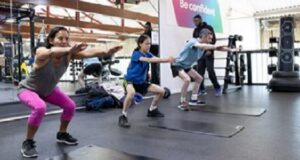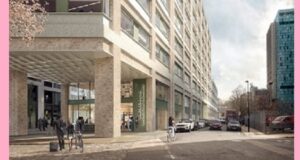A year-long project led by school girls in east London has produced life saving results.
Girls at Plashet School in the Olympic Borough of Newham have been promoting the early detection of breast cancer to their mums, aunties and grannies. Cancer survival rates in Newham are amongst the worst in the country, but the girls have the satisfaction of knowing that they have already saved one life: a member of staff at the school carried out her first ever breast self-examination at the age of 47, and found that she had a lump, which was later diagnosed as breast cancer. Edythe Labinjo is in no doubt “this project has saved my life.” Edythe received treatment and is now back at work.
Community Links worker Frances Clarke initiated the project after reading research which showed that early detection of breast cancer was low in east London. Frances, who has survived breast cancer herself, was determined to work to reduce the unnecessary loss of life that results from late detection. The local NHS funded the project and provided a range of resources from their “small c” campaign, which aims to bring cancer down to size by catching it early while still small and more easily treatable.
Young Lifesavers
Pupils signed up as Young Lifesavers and worked with Frances and her team of volunteers to create resources which would share the essential information about the possible signs and symptoms of breast cancer, the need for regular self examination, the importance of going to the GP with any concerns and the life saving role of breast screening.
The project began with lessons for all of the 18 classes of girls in years 9 and 10. Peer volunteers, many of whom were young ex-Plashet School pupils now studying bio-medical science or medicine and several who were cancer survivors, joined Frances to make classroom presentations to 540 girls. “We created an entertaining and informative lesson with videos and songs and interactive games,” explains volunteer Nida Thamennah. “We urged the girls to overcome their embarrassment and to take home the life saving messages. They responded very maturely to the challenge.”
Pupils were then asked to sign up as Young Lifesavers to work with Frances and her team to create resources which would share the essential information about the possible signs and symptoms of breast cancer, the need for regular self examination, the importance of going to the GP with any concerns and the life saving role of breast screening. The excitement in the project was reflected in the numbers signing up – 92 in all.
Girls detect cancer in chicken breasts
A highlight of the year was the visit to the St Bartholomew’s breast screening unit for over 50 girls and staff where they were given a full tour, led by experienced NHS staff. The girls saw mammogram machines, MRI scanners and even got to use an ultra-sound scanner when they practised cancer detection on a chicken breast stuffed with olives. This visit helped to embed the knowledge in the girls’ minds and was filmed in order to share with the rest of the pupils. Some pupils even came away thinking of careers in radiology.
“It became clear that we would be able to share the information effectively with the girls, but the challenge remained og how to send the information home.” Frances Clarke.
The Young Lifesavers focussed their efforts on finding ways to reach mums and other women relatives. Women who do not speak or read English were of real concern, as it was felt that they would not be receiving information from anyone about breast cancer. In response the girls created podcasts in Asian languages which their mums could access through the school intranet.
Mums too busy to care?
Would the mums have the time to take notice? Being busy is often cited as a reason why women don’t prioritise their own health. The Young Lifesavers responded to this by creating an evening of entertainment and information which would attract their mums to come into school to see their daughters perform. This approach was vindicated when over 250 mums and girls attended the Girls’ and Mums’ Night. During the event, girls made presentations about cancer and performed a play in which three women responded differently to finding they had breast lumps. The choir sang the cancer anthem “Just Stand Up” and girls surveyed their mothers’ attitudes to cancer. This was all done while drinking pink squash and eating home-made pink cakes. In the background multi-lingual films played showing women detecting their cancers early, and on the tables multilingual leaflets spelled out the signs and symptoms and the need for self-examination. The mothers responded with great enthusiasm and humour to all of these resources but in particular to the girls performances and the health messages they contained.
The project had saved one life and it was clear that many women had participated in the awareness raising activities, but what had it meant for the girls’ and women’s knowledge levels overall? The project assessed this using the nationally recognised Breast Cancer Awareness Measure (B-CAM). At the start of the project 613 women and girls completed this nine page questionnaire and at the end 624 completed it.
Positive Results
Ability to name the possible signs and symptoms of breast cancer rose: 70% of girls and 77% of mums could name nine or more symptoms at the end of the year, compared with 12% and 23% respectively at the start.
Frequency of regular breast self-examination rose from 42% to 57% for girls and 37% to 46% for mums.
The percentage who were fairly or very confident to notice a change in the breast rose from 32% to 46% for girls and 46% to 53% for mothers.
Those who would contact a doctor within two weeks if they found a change improved for girls, rising from 72% to 80%, and stayed stable for women at 85%.
Originally 14% of girls said they would never contact a doctor if they found a change in their breast: this reduced to 7.2%. For mums it dropped to 1.6% from 5%.
Knowledge of the existence of a breast screening service rose from 48% to 84% for girls and for mums rose from 56% to 87%.
The B-CAM results testify to the success of the project – the girls own knowledge and confidence has increased significantly and they have simultaneously motivated their mums and other women family members to change their attitudes and behaviour. The project has shown that girls can deliver life saving awareness messages to their mothers and motivate them to be more actively aware of their own breast health.
Save one life: save many lives
Having saved one life, the project is keen to share the learning widely so that more women’s lives can be saved by identifying the signs of cancer and taking action early. Frances explains “We produced a detailed guide outlining the approaches we took and the resources we used in the hope that it will be useful in other communities and help to save more lives.”
To obtain a copy of the report Beating Cancer at School – Working with Plashet School on early action to save lives, contact Community Links, 105 Barking Road, London E16 4HQ or email frances.clarke@community-links.org.
 East London News A Force for the community…
East London News A Force for the community…






Hi Frances,
I think this is a good idea I would like to join you.
Bilquis
Please ring on 0207 473 9642 and leave your details, then I will contact you to send information about our future activities